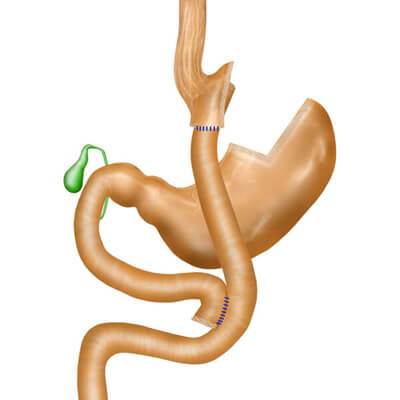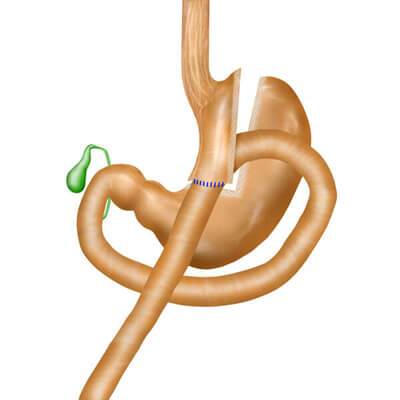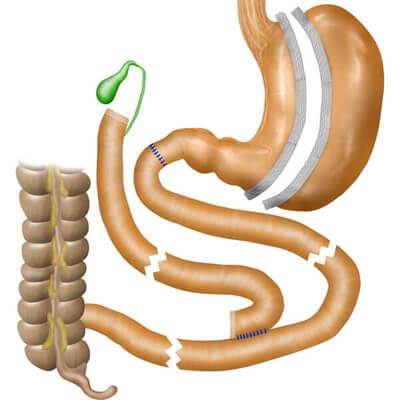Gastric Bypass in Turkey
Contact us for gastric bypass surgery in TurkeyGastric Bypass in Turkey
The aim of gastric reduction using gastric bypass in Antalya is to return heavily overweight patients to a healthy normal weight and to avoid, reverse or alleviate concomitant diseases due to obesity. Gastric bypass surgery in Turkey is a bariatric procedure that can be completely reversed.
Stomach reduction Turkey without irreversible organ removal
In Turkey, gastric bypass surgery is used to reduce the size of the stomach in such a way that the patient eats and digests smaller portions normally. During the surgical procedure, the stomach is divided into a so-called forehead and main stomach and the forehead is connected to the first loop of the small intestine. As a result, no food reaches the main stomach, so that the patient eats significantly less and still feels full for a long period of time.
Moreover, the food no longer reaches those cells in the main stomach that are responsible for the release of the hormone ghrelin, which also helps to reduce the need for sugar and eliminate the feeling of hunger. Except for the second part of the stomach, the digestive tract retains its usual function after the stomach reduction surgery in Turkey. All nutrients, including any necessary vitamin preparations and/or medication, can be absorbed by the body. The bowel movement remains normal.


Drastic, sustained weight loss through stomach bypass Turkey
On average, patients after successful gastric bypass surgery in Turkey lose 60 to 70 percent of their excess weight in the first year, with the largest weight loss occurring within the first three months.
Improved health parameters, better quality of life
The greatest advantages of this obesity surgery in Antalya are the rapidly improving health parameters: Experience has shown that weight loss is accompanied by a reduction in cholesterol levels and blood pressure. Back problems improve and sleep apnea disappears. Furthermore the surgical stomach reduction can stop a threatening diabetes by means of bypass as consequence of the extreme predominance and reduce the suffering of formerly obese diabetics and in the best case even heal. In addition, people who have undergone gastric bypass surgery in Turkey automatically eat a healthier diet because they tolerate light food, fruit and vegetables best. This makes them generally feel more alive and fitter.
Gastric bypass in Turkey: frequent and safe surgery
Gastric bypass surgery is particularly suitable for overweight people who have not succeeded in reducing their weight to a healthy level despite a large number of dietary attempts. However, the current BMI should not exceed 55, as this type of obesity therapy then carries a too high risk of complications. For this group of patients, an experienced surgeon is more likely to recommend a sleeve resection (partial removal of the stomach), with which they initially lose around 50 kg of weight. In most cases, a gastric bypass operation in Antalya is then possible without any problems and also makes sense.

Roux-en-Y gastric bypass surgery Turkey
The Roux-en-Y gastric bypass (roux en Y gastric by-pass) is one of the most frequently performed obesity surgeries in Turkey and is, therefore, one of the established standard procedures. During the surgical procedure, a comparatively small part of the stomach is separated from the rest of the stomach right after the entrance to the stomach. The small part of the stomach only holds a maximum volume of 20 ml. It is called a “pouch” in the medical language, which means “small pouch” in English. In addition, the small intestine is also severed. The surgeon connects one end of the small intestine to the stomach pouch, the other end to a deeper section of the intestine. As a result, the already small amount of food comes into contact with the digestive juices of the bile and pancreas only late and briefly.
This construction bypasses most of the stomach and part of the digestive system behind it and remains switched off for food utilization. During the gastric bypass operation in Turkey, the residual stomach is not removed. This means that the patient keeps his entire stomach in the body. Thus the Roux-en-Y gastric bypass can be completely removed by another bariatric intervention in Turkey, if required or at the request of the patient.
Surgical procedure Omega loop gastric bypass Turkey
The Omega loop stomach bypass (mini gastric by-pass) is a special form of gastric bypass surgery that is performed frequently and routinely in Turkey. Similar to the Roux-en-Y stomach bypass in Turkey, the surgeon separates a small portion of the stomach from the rest of the stomach behind the stomach entrance. However, this gastroenterological operation in Turkey does not involve the separation of the small intestine. The surgeon connects only the smaller, upper part of the stomach (pouch) with the small intestine and thus switches off the lower main stomach as food passage.
In addition to numerous advantages, the mini gastric by-pass bears the risk of permanent bile refluxes (heartburn) and thus damage to the mucous membrane of the oesophagus as a result of constant acid stimulation. This is why this obesity therapy in Turkey is generally suitable for older patients or for important reasons that speak against a Roux-en-Y stomach bypass. As the stomach remains intact in its entirety, this gastric bypass from Turkey can also be used to reduce it if necessary and thus restore the original condition.
Both the Roux-en-Y gastric bypass surgery and the Omega loop gastric bypass surgery are performed in Turkey laparoscopically (keyhole technique) via five to six small accesses in the abdominal wall.


Operation procedure biliopancreatic division after Scopinario Turkey
This bariatric operation procedure, often also referred to as transit bipartition, was developed by the Italian surgeon Scopinaro and has been successfully implemented in Turkey for several years. Similar to the Roux-en-Y stomach bypass in Turkey, the stomach is divided into a small stomach pouch and a large residual stomach, which together with a large part of the small intestine remains excluded from the food passage. In comparison to the Roux-en-Y-bypass Turkey, almost the entire small intestine is switched off here. Thus, the digestive tract is much shorter, resulting in a massive starch-fat absorption disorder.
The biliopancreatic division after Scopinario sets massive hormonal changes in motion and leads usually to a rapid improvement of the metabolic, which benefits in particular obese patients, who suffer from diabetes type 2.
The members of the gastric bypass surgery team in Turkey are experienced experts in the field of obesity surgery who have completed their training at renowned clinics in Turkey and abroad. Many doctors also actively teach at medical faculties and universities. Nevertheless, the gastric bypass costs in Turkey, inclusive preliminary investigation, consultation, laboratory, adipositas surgery, hospital stay, care, food supply, medicines, materials and after surgery check-ups, are due to the smaller personnel and general expenses in Turkey, on the average 40 to 50 per cent under those in Europe, America and Australia.
Gastric bypass surgery Turkey: professionally planned surgery under general anesthesia
Patients who decide to undergo gastric bypass surgery in Turkey can be sure that they will be treated in a well-equipped, state-of-the-art clinic. All areas and systems are networked so that every doctor in every area of the clinic has access to detailed patient data. The excellent organisation of obesity surgery in Turkey saves the patient long journeys and unnecessary double examinations. In addition, the intelligent building technology enables rapid intervention in the event of rare complications.
Every gastric bypass operation in Turkey is performed under general anaesthesia. Experienced anaesthesiologists specialising in obese patients accompany the gastroenterological intervention in the operating theatre and immediately after the operation.
Qualified care in Turkey
Although primary obesity surgery is considered safe in Turkey, a certain risk of complications cannot be completely eliminated. Therefore, the surgeon in charge carefully and responsibly informs his patients before the procedure about the risks and side effects that may occur during or immediately after gastric bypass surgery in Turkey.
Gastric bypass Turkey: fast and lasting weight loss
Experience has shown that the surgical intervention leads to a reduction in overweight of 60 to 70 percent within the first two years. Reasons are the reduced feeling of hunger, the food portions that are significantly smaller after the operation in Turkey than before and the changed eating behaviour with more vegetables, fish and low-fat meat. In addition to a healthy diet, regular monitoring of the vitamin and mineral balance is important. The threat of vitamin deficiency must be counteracted in good time with appropriate dietary supplements.
Previously strongly over-weighty persons frequently suffer after the drastic weight loss from strong skin slackness and disturbing skin lobes, with which they feel extremely unwell. Cosmetic surgery in Turkey can correct this problem and contribute to the improvement of the feeling of being alive.
Gastric bypass costs in Turkey
The members of the gastric bypass surgery team in Turkey are experienced experts in the field of obesity surgery who have completed their training at renowned clinics in Turkey and abroad. Many doctors also actively teach at medical faculties and universities. Nevertheless, the gastric bypass costs in Turkey, inclusive preliminary investigation, consultation, laboratory, adipositas surgery, hospital stay, care, food supply, medicines, materials and after surgery check-ups, are due to the smaller personnel and general expenses in Turkey, on the average 40 to 50 per cent under those in Europe, America and Australia.
